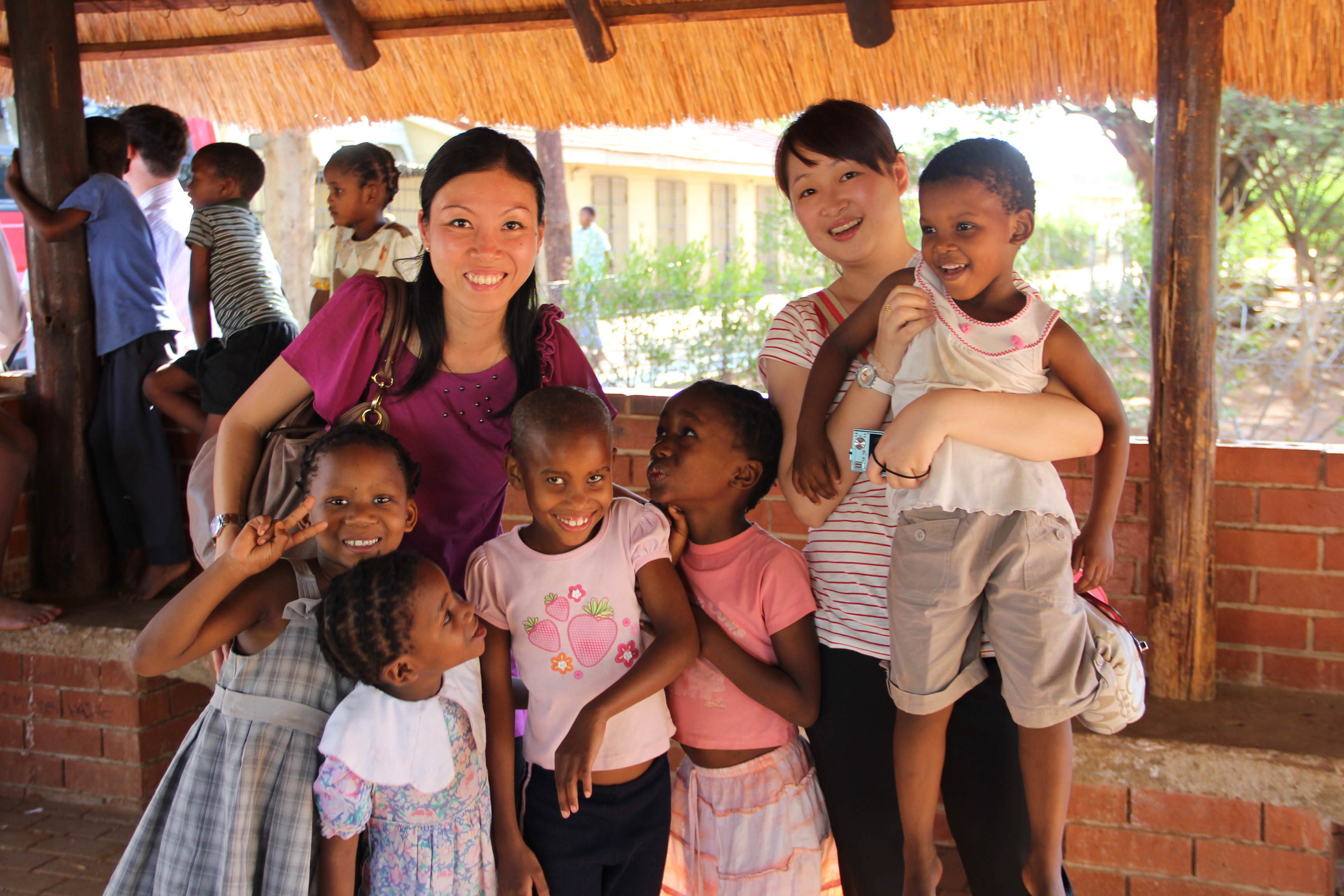Tiroyaone is much like any 18-year-old. He enjoys playing soccer with his friends, has a passion for geography and someday hopes to travel the world. Next year, he will attend university, an experience reserved for Botswana’s best and brightest students.
“I’m looking forward to finishing school and looking for a good job after I get my degree,” he says, after waking up at 5 a.m. to prepare for class. One day, he would like to live in New York City, a dream he hopes to achieve by working hard and getting good grades.

Tiroyaone present-day, in front of the village house sponsored by Dalumi.
But the future wasn’t always as bright for Tiroyaone. His mother was an alcoholic who would often leave her young children without supervision. His two older brothers were engaged in child labor, working long hours as herders although they were far below the legal working age. Eventually, Tiroyaone and his brothers were put into the care of their ailing grandmother, who lacked the financial means to provide for them. Social workers intervened, taking custody of the children and placing them in a safe environment.
The brothers were placed in S.O.S. Children’s Village in Tlokweng, a small settlement on the outskirts of Gaborone, the country’s capital. More than just an orphanage, the organization has provided family-style housing for up to 182 children between the ages of 1 to 18 since it opened its doors in 1989. Its inhabitants receive access to healthcare, education, counseling services and plenty of social activities—in short, everything a child needs to live a successful, safe and healthy life.
“The village is loaded with a lot of things that make the children feel that they are really at home,” says Innocent Kanyama, Dalumi Botswana Human Resources Manager and the liaison between S.O.S. in Tlokweng and diamond industry leader, Dalumi Group—a major sponsor of S.O.S. “The children have a lot of facilities that they can use to play together and eat together and learn from each other.”
A resource-rich country, Botswana has seen incredible growth and development in recent decades. Currently, it is the world’s largest diamond producer in terms of value. Revenue from the diamond industry has helped to boost the country’s economy, combat the spread of HIV/AIDS, and reduce the poverty rate by more than 15% in the past decade. Botswana boasts a stable democracy since its independence, and as such, supports many initiatives for the betterment of its citizens. The government’s Children’ Act of 2009, for example, promises safety and security to vulnerable children like Tiroyaone While great strides have been made in ensuring that all children receive proper care, many are still in need of safe homes.
Fortunately, S.O.S. has stepped in to help. Supporting a child’s need for long-term, loving relationships, younger children live in a family house with a small number of peers that they treat as their brothers and sisters. They are cared for by a house mother, who is appointed by the organization to teach them the life skills necessary to become successful and independent adults. The unique setup provides a supportive framework for children who are no longer able to live with their biological families.
True to the company’s mission of giving back to the communities in which it operates, Dalumi Group has supported S.O.S. in Tlokweng since it began operating in Botswana in 2007. Dalumi provides enough financial support to ensure that a house of nine children has clothing, school supplies, medicine, and whatever else they might need to live healthy and happy lives. In addition to Dalumi Group’s sponsorship of the house, their diamond brand SWANA, which is produced in Botswana, also promotes the story of the S.O.S. Village in Gaborone to its consumers.

In front of the house sponsored by Dalumi. From left to right: Dalumi General Manager Mrs. Ramadevi, S.O.S. children, House Mother (fourth from left), and Mr. Innocent Kanyama, Dalumi Botswana Human Resources Manager.
“It’s been just fine growing up in the village”, says Tiroyaone. “They support us equally and they understand our situations.”
Going above and beyond traditional corporate sponsorship, Kanyama, the company’s representative at S.O.S., visits the children every few weeks. “Giving money is not enough,” he shares. “We want to spend time with them, play with them, and have some fun with them, to let them know that we care about their futures.”

In front of the S.O.S. Children’s Village. From left: Kanyama, children of the Dalumi House, Ramadevi.
At the age of 16, when children are ready to live a more independent lifestyle, they join S.O.S.’s Youth Program and live in homes with peers their own age. They work with counselors who help guide them through the transition to adulthood. For many, this includes plans to attend university or learn useful trades, like welding and mechanics, at vocational school. Several bright scholars have received scholarships to study at prestigious universities abroad and in Botswana, something that would have that would have been next to impossible without the support of the S.O.S. Village and its sponsors.

During the Dalumi Group Christmas party, where Dalumi staff presented the children with Christmas gifts. From left to right: S.O.S. Children, the House Mother, Ramadevi, and Kanyama.
Throughout the eight years he has spent working with S.O.S., Kanyama has been endlessly inspired by the children and their stories. He speaks of Marcego, a responsible young woman who would often help the house mother to look after her adopted brothers and sisters. She now lives in a nearby village, where she is looking for a job in fashion design. “We have kept in contact with her since she left the house to find out how she’s doing.”
Says Innocent, “Dalumi is a family name, and we want to treat the children at S.O.S. like our brothers and sisters. We believe in reaching out and caring about people and trying to understand their needs.”


